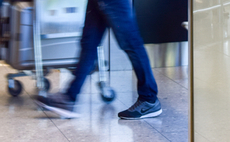Businesses in the sector struggling to deal with the recession, says research
Coby: IT spending will plunge to 1.7 per cent this year in the airline sector Airline investment in IT will plunge to unprecedented low levels this year as the industry struggles to cope with mas...
To continue reading this article...
Join Computing
- Unlimited access to real-time news, analysis and opinion from the technology industry
- Receive important and breaking news in our daily newsletter
- Be the first to hear about our events and awards programmes
- Join live member only interviews with IT leaders at the ‘IT Lounge’; your chance to ask your burning tech questions and have them answered
- Access to the Computing Delta hub providing market intelligence and research
- Receive our members-only newsletter with exclusive opinion pieces from senior IT Leaders




















